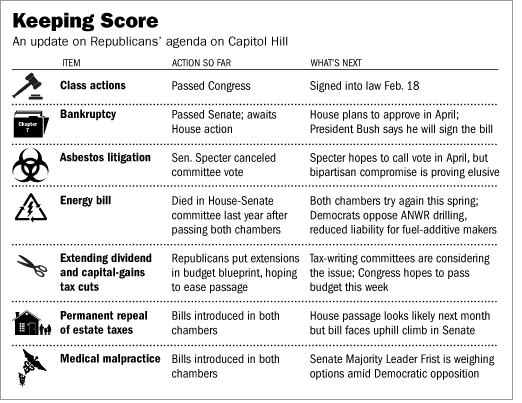In any case, the selection of Wolfowitz is likely to give a second wind to the global justice movement, uniting it with the anti-war movement, in the United States as well as elsewhere. Several upcoming events are inviting targets for activists: the World Bank and the International Monetary Fund's 2005 Spring Meetings on April 16-17 in Washington D.C.; and their 2005 Annual Meetings on September 26-27 in Washington D.C.
A momentum to break open debtors' prisons that the Washington Consensus built in the global south has been building up.
In 1902, after Venezuela defaulted on its sovereign debt, German, British and Italian gunboats blockaded the country's ports until the government paid up. In 1881, after the Ottoman empire failed to honour its obligations, European powers simply seized Ottoman customs houses and helped themselves to their due. The options available to more than 500,000 aggrieved creditors of the Republic of Argentina, which defaulted on bonds worth $81 billion in December 2001, were more limited. After much bluff and bluster, a large majority of them meekly surrendered their claims before a deadline on February 25th, in exchange for new bonds worth roughly 35 cents on the dollar.Activists who said that default would be good for Argentina, as it would "have more cash on hand for social and health programmes" (Emad Mekay, "Activists View Argentina's World Bank Default as Positive," Inter Press Service, November 15, 2002), were proven correct. "Argentina's fundamentals have certainly been impressive. The economy has grown about 9 per cent for two consecutive years and with consumer confidence improving and the rising price of soya, Argentina's main agricultural product, economists say growth in 2005 will be more than 6 per cent," says Adam Thomson of the Financial Times ("Post-debt Argentina Ready to Resume Its Place in the Sun," London Edition, March 16, 2005, p. 44). Other highly indebted governments, pressured by the restive poor, must be paying attention to Argentina's successful challenge to the IMF, the WB, and other international financial institutions' power to set debtors' domestic economic policy and dictate the terms of debt service.
The giant debt swap is epic in scale. It involves 152 varieties of paper denominated in six currencies and governed by eight jurisdictions. These bonds will now be exchangeable for three new issues. More importantly, the swap carries important lessons for emerging-market creditors and debtors alike. Bondholder groups think it a travesty. But on March 1st, Néstor Kirchner, Argentina's president, declared the restructuring a triumph, claiming "at least 70-75%" of bondholders had accepted it. As The Economist went to press, detailed figures were still not available, though some reports suggested that the level of acceptances was even higher than Mr Kirchner's claim.
. . . . . . . . . . . . . . . . . . . .
“Restructuring was formerly a taboo word, now it's a topic of open conversation,” says Walter Molano, of BCP Securities. The “haircut” inflicted on bondholders—the proportion of debt that Mr Kirchner has successfully written off—sets a new standard. In other restructurings, creditors have had to accept either a cut in principal, a lengthening of maturity or a reduction in interest payments. Argentina has achieved all three.
. . . . . . . . . . . . . . . . . . . .At around 75% of GDP, Argentina's debt ratio remains higher than the 52% carried by its neighbour Brazil. But the interest burden on Argentina's debts is now much lighter (a coupon of 2-5% in the first 10 years, compared with 10% in Brazil) and the maturities much longer than the market would normally accept. No big Latin American government has ever fully repaid a 30-year bond; Argentina has offered a 42-year bond.
Standard & Poor's, a credit rating agency, has said it will upgrade Argentina to B- after a successful debt swap, a rating shared by Ecuador, Suriname and Lebanon.
(emphasis added, "Argentina's Debt Restructuring: A Victory by Default?" The Economist, March 3, 2005)
In light of such development, Bush's choice of Wolfowitz is all the more puzzling. John Dizard of the Financial Times observed: "In the past the IMF has been characterised as an instrument of America's financial foreign policy. For that to be true the US would need to have a financial foreign policy, which right now it doesn't. John Snow, Treasury secretary, is preoccupied with tax and Social Security proposals; his deputies responsible for international policy are in the process of moving on to their next resumé entries" ("Mysterious Hope for Argentine Deal," March 13, 2005) -- the absence of "a financial foreign policy" that is underscored by the nomination of a Pentagon hawk for World Bank presidency.
To be sure, there is no lack of clarity in the domestic business agenda. The White House and Congress delivered the Class Action Fairness Act of 2005 and is about to deliver the Bankruptcy Abuse Prevention and Consumer Protection Act of 2005. The Wall Street Journal's scorecard makes clear the progress of the business agenda:

All of them, however, either do nothing to defuse or make bigger ticking economic time bombs -- the ballooning housing bubble, mounting consumer debts, the credit bubble, the widening current account deficit, rising oil prices, the falling dollar, and so on -- that may go off any time. Any or all of the bombs may prove to be duds or carry only small charges of explosives, but only Dr. Pangloss could be confident that none would ever blow up in the face of the US economy.





No comments:
Post a Comment